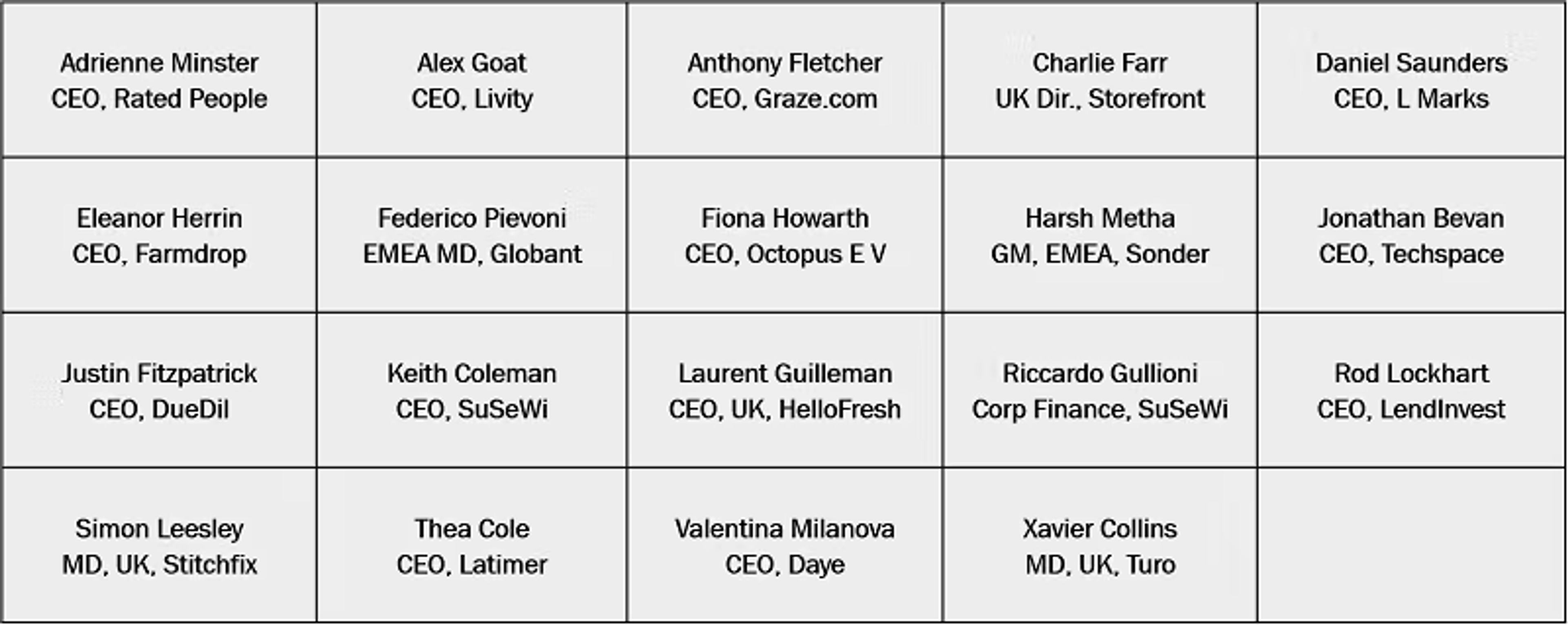
CEO/MD Forum | Featuring Martín Migoya - Founder & CEO, Globant
Founders Keepers hosted the latest CEO/MD Forum on Tuesday 5th May, featuring 25 CEOs, including special guest speaker Martín Migoya - Founder and CEO of Globant.

Martín Migoya - Founder & CEO, Globant
After sharing his and Globant’s incredible story of growth and constant disruption, Martin took questions from the Forum on a broad range of subjects, including how to scale, empowering remote teams, true digital disruption and the potential opportunities to come from the Covid-19 pandemic.
The key takeaways from our conversation, featuring leaders from public, Private, Private Equity and Venture Capital-backed businesses from across the world, are summarized below.
Martín Migoya on the story of Globant
In 2003, LastMinute.com gave us the opportunity to build out their revolutionary dynamic package pricing product – pulling together a singularly priced travel package and presenting it to customers in real time. The spotlight of such a cornerstone account helped us to scale. More importantly, it showed us that the next generation of software would have to connect with consumers in a totally different way.
In 2006, Google appointed us their first external software provider. We’d competed with a huge number of vendors, but Google cited our passion for open source, agile working and the combination of engineering and design. Building out a team in the tiny Argentinian town of Tandil, we worked on hundreds of Google projects, from Adwords to Android, soon becoming regarded by many as “the best kept secret in Silicon Valley”, with Electronic Arts, LinkedIn and Disney deals all following soon afterwards.
Our goal has always been to deliver genuine digital transformation. It’s a term that seems to be thrown around by corporates constantly. I believe we were privileged to partner with Disney on the first true digital transformation project: the Magic Band, a wristband that now powers every part of the Disney customer’s journey; from opening their hotel room to purchasing their food, drink and products.
Magic Band represented a huge, global company, choosing to dedicate a massive amount of money to rethinking its entire model, to create a better, more emotionally relatable customer experience for its users. The project was seminal in our thinking, and we’ve since looked to do the same for any company’s consumers, across any sector. Today, Globant’s products impact more than 600m customers worldwide.
In 2014, we completed our IPO, becoming the first Latin American software company to list on the NYSE. Today, we have more than 12,000 employees, in 17 countries, creating and deploying cutting edge technologies. With the rise of artificial intelligence, digital transformation has been joined by cognitive transformation, and we focus much of our time on this powerful technology in all we do.
Augmented collaboration – The next radical transformation
The Covid pandemic has shown that, although valuable, platforms like Zoom are only a first-generation solution. The leading problem-solving organisations in the world rely on their staff having serendipitous conversations by desks, in meetings or around coffee machines; interactions crucial to the creative and innovative process.
At Globant, having always been remotely distributed, we’ve thought about this a lot. Eight years ago, we created StarMeUp OS – a peer-to-peer rewards platform to help our staff (Globers) assess their and their colleagues’ impact and, equally valuably, embodiment of our values. Essentially, it’s the nervous system of our business, making transparent every element of Globant’s behaviour.
Assessed through our AI tools, StarMeUp OS data can predict who amongst our staff may be at risk of leaving the company, allowing us to mitigate. Further, we can create a distance version of the random interactions Globers find so valuable, setting up unplanned virtual meetings with people who are geographically distant from each other, yet well matched in terms of their thinking, problem solving and potential to help each other.
Taken to the next level, we have deployed AI to change the way we code. Coding is a team sport, made better through constant debate and creativity to solve complex problems. Our AI system learns how an individual developer works, understands what they are building and presents suggestions on how they can best augment their code to succeed.
The professional services sector has not seen any major disruption for fifty years. We want to be the leading company in driving that change, and augmented collaboration is our offering.
Distributed working can drive productivity, but risks burnout if not properly managed
We’re all seeing how difficult this is. The amount of energy required to communicate on video conferences is factors greater than a face-to-face meeting. We don’t have to move an inch all day to get to our next meeting and, currently, many people are alone, or overrun with other full-time responsibilities, such as childcare and schooling.
Contact with colleagues and friends is crucial. Our Globant Paluza project is a series of virtual concerts, featuring famous musicians, just for staff. We really want Globers to have the option of attending virtual, non-work activities, to make sure they’re receiving some positive energy from the other side of their screens.
Of course, productivity is great, but the enabling of serendipity and social cohesion are far far more important. We need to provide tools and options for our staff, now more than ever.
Empowering teams and culture through “flipping the org chart”
Traditional professional services companies are huge, complex pyramids. The people at the bottom, doing the actual delivery and owning the day to day client relationships, have absolutely no control over decision making, which is often too slow.
Professional services companies have to move fast. So, we flipped our org chart. Our pods decide how to engage with their customers, pricing, promotions, leadership and more. The executive are there purely to support them, at the bottom of the chart.
We’re a three level, 12,000 people company, all made possible through technology.
If you want to revolutionize an industry, you need to do more than augment culture. You need facts, provided in our case by StarMeUp OS. If the whole organisation understands the power of data in culture, there’s really no need for management in the middle.
Any organisation that stills think culture is on a Powerpoint slide has massive problem.
Disrupting a firmly established market takes time, consistency and a differentiated offering
Building a winning culture, message and proposition to take on the incumbents in the market is exceptionally difficult. Luck plays a significant part of course, but so does a consistent, deliberate method and methodology. This is a lesson I had to learn. When I hired my first business development executive, I wanted to fire him after six months. He wasn’t bringing anything in. I’m glad I didn’t though; two years in, he was absolutely central to our scaling.
Why? Because he’d taken the time to build our relationships, differentiating Globant from the competition and, eventually, disrupting the incumbents through patience, passion and a long-term approach, always communicating through our values.
The impacts, lessons and opportunities of Covid-19
Without a doubt, this pandemic will be an accelerating factor for innovation. Whether you’re a company, NGO or government, this is a moment of unprecedented opportunity.
Understandably, businesses are currently focusing on liquidity and survival. Mid-term, there will be an acceleration of transformation projects. I’m receiving calls on a daily basis from across the globe from company leaders now looking to deploy the “long-term projects” they never got around to actioning before they really needed them.
I think Covid-19 has also exposed the world’s failure to realise the true speed, depth and reach of tech. Companies like Apple and Google had the data to help us avoid a pandemic, but various factors, including current data policies, meant that we couldn’t action that data.
We need to find a way to make our tech companies more relevant and connected to the real things that happen in the world. They talk about potential – what they could do. But, as Coronavirus has demonstrated, when trouble does strike, we don’t have the fix we need.
With thanks to our Forum Attendees.

Author
Stephen Rosenthal is a Partner at Founders Keepers and the facilitator of the CEO/MD Forum, a global virtual meeting for senior leaders of the world’s most dynamic businesses, across every asset class, sector, and geography.
If you would like to join the CEO/MD Forum or learn more, please don’t hesitate to contact Stephen on stephen@founderskeepers.co or +44 7725 144 124.
